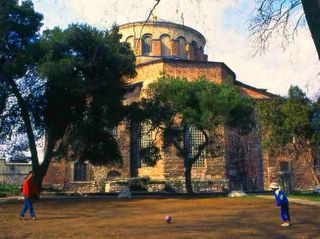
A while back I got an email from blog reader Patrick Vickery (a gardener and author who lives in the Scottish Highlands and writes lovely snippets and anecdotes called blethers). He’d enjoyed my post, “The universal language of pigeon,” in which Adam and Dana use the feeding of birds to interact and make friends with people whose language they don’t speak. It’s worked everywhere from Lisbon to La Paz. The entente-building power of a few fistfuls of corn thrown into the air by a kid standing in a big public space is amazing (and fun to watch).
Wrote Patrick, “Universal language of the pigeon…Great phrase. Could also apply (to a lesser extent perhaps) to football – a common 'language' across the world. Give warring nations/factions/groups a football and they may well end up playing together in preference to anything else. I would hope so anyway.”
Football was the vehicle for some cross-cultural bonding during a tour that Adam and I took of Istanbul's Topkapi Palace, a vast complex sitting grandly atop Seraglio Point overlooking the shimmering Bosphorus, the Sea of Marmara and the Golden Horn. Built in the 15th century by Mehmet the Conqueror after he turned Constantinople into Istanbul, and home to four centuries of Ottoman rulers, the sultans' palace turned museum takes hours to explore, and I was worried about boring Adam silly with too many rooms, too many buildings and too much guide commentary. Adam was younger then, and I needed to approach Topkapi in surgical strike mode. We couldn’t do it all, so I had to decide what to see and what to skip.
As the tour guide announced she’d be leading us first to the harem, two Turkish teenagers who’d been kicking a soccer ball on the palace grounds -- just inside the gate and in the shadow of the only Christian church Mehmet did not convert into a mosque in order to give his non-Muslim wives a sanctuary -- held the ball up and motioned to Adam to join them. His eyes lit up.
So did mine. Their timing was perfect. Adam could play soccer in the sun instead of spending a half hour with a bunch of adults inside a dark building full of cells, and I could escape having to answer the question, “Mom, what’s a harem?”
In what was likely Topkapi’s first international football match, Turkey threw the game and let America win. The football diplomacy included smiles, hand signals, pats on backs, and lines and letters drawn in the dirt with sticks. We learned the two boys were 12 and 14 and were allowed inside the palace compound because their parents worked at Topkapi.
When the tour group exited the harem, before we turned to catch up (the next stop would be the Adam-friendly treasury, full of cool stuff like daggers, swords and jewels the size of golf balls), I thanked the teens.
Whether they knew it or not, when they invited the young American boy to kick that ball around with them they became gracious ambassadors. Each kick, each shout, each smile said, “We’re friends. You are welcome here.”
